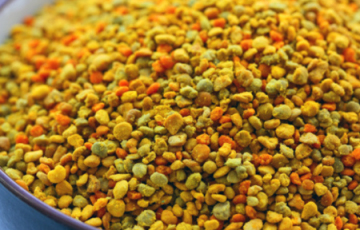POLLEN
Bees gather pollen on the blossom of plants; afterwards they add some honey and enzymes and preserve it in the comb cells. Pollen scraped out of the comb is called scraped bee bread. On the other hand, trapped fresh pollen is the pollen scraped off bees’ legs as they go into the hive.
A pellet of pollen is made out of thousands of pollen grains. Its colour depends on a plant it originates from. Pollen is considered to be a rich source of proteins, vitamins, and minerals in ones diet. It contains approximately 27% of proteins, 30% of carbohydrates, 5% of fat, and 7% of minerals. In addition, pollen contains pigments, vitamins, aromatic substances with antibiotic effects and other ingredients.
It is the source of essential amino acids such as linoleic acid, linolenic acid, and arachidonic acid, which are all essential to humans. As amino acids cannot be synthesized by human organism, it is vital to consume them with food.
Pollen also contains vitamin B complex, pro vitamin A, and vitamins C, D, and K. We recommend it to convalescents, senior people as well as to vegetarians as an important source of amino acids.
IT IS WELL-KNOWN THAT POLLEN HAS NUMEROUS MEDICAL EFFECTS, SOME OF WHICH ARE LISTED BELOW:
- it regulates digestion,
- stimulates production of white and red blood cells and haemoglobin,
- strengthens the immune system,
- has antioxidant effects,
- neutralizes free radicals, helping heart disease and cancer prevention, slows down aging,
- stimulates brain function and improves mood,
- improves eyesight,
- helps to prevent stress,
- fights virus infections
- prevents prostate diseases, eases hypertension and relieves inflammations,
- enhances liver functions.
Pollen can be consumed pure or with yoghurt, fruit juice, milk, honey drinks, lukewarm or cold teas. As a prevention of diseases, it is recommended to consume it for three months, three times a day before eating. For best results, it should be taken at the beginning of fall and at the end of winter.
Dried pollen which contains 5-8% of moisture must be stored in an airtight container kept in a refrigerator or in a cold dark space. If you want to keep it for a longer period, it is best to store it in a freezer or mix it with honey.
AT PISLAK BALI BEEKEEPING WE OFFER:
100g and 400g glass jars
PVC bags of various sizes depending on your order



